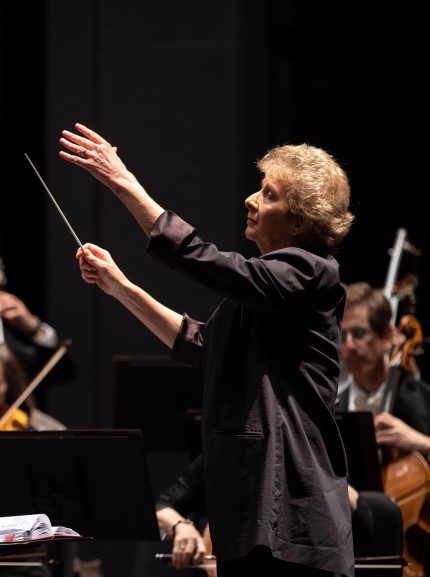Glover, MOB offer rare comical Bach and not too funny Haydn

Johann Sebastian Bach gave us over two hundred church cantatas, ground-breaking concertos, extraordinary instrumental works and some of the funniest comic operas ever written.
Okay, the last maybe not so much. But Bach did write a handful of secular cantatas, one of which, the so-called “Coffee Cantata,” was presented by Music of the Baroque Monday night at the Harris Theater, led by Jane Glover.
Cantata No. 211, “Schweigt stille, plaudert nicht,” is an outlier in Bach’s vast output. This slender scenario concerns one Schlendrian who is frustrated by his daughter Lieschen (or Liesgen) and her obsessive fondness for coffee. He tries to cajole her with dresses and other distractions into staying away from evil caffeine, all to no avail—until he tells her that she will never find a husband unless she gives up coffee. Lieschen immediately capitulates but she has the last word, as the narrator explains that the girl will admit no suitor to the house unless he promises that she will still be allowed to have coffee. As the final trio blithely puts it, “The cat won’t give up catching mice, and young ladies will stay loyal to their coffee.”
In addition to containing about a dozen sexism triggers to tender contemporary sensibilities, the “Coffee Cantata” is not exactly a work of knee-slapping hilarity. But the domestic comic scenario is quaint and charming in its offbeat fashion, and the music is wholly delightful. This is the closest Bach ever came to writing a comic opera and, as Glover nicely put it in her introduction, “We see him smiling in the wings and we have a bit of the greasepaint.”
It’s also an early and crafty bit of artistic product placement by Bach, since the cantata was likely written for and premiered at Zimmermann’s Coffee House in Leipzig.
Bach’s cantata was the clear highlight of Monday’s MOB program with Glover leading a buoyant and deftly balanced performance that kept the arias, humor and intimate scale of the work in ideal proportion.
A superb trio of singers sold the cantata’s unique charms. It was luxury casting to nab the rising soprano Joelle Harvey for this brief Bach assignment as Lieschen. Harvey brought a light comic touch to her singing and facial expressions, and her bright, flexible soprano shone in “Heute notch, lieber Vater, tut es doch!” with principal flute Mary Stolper’s graceful obbligato on the same level.
Equally rich casting was baritone Neil Davies as Schlendrian. Without going over the top, he imbued the exasperated father with just enough comic bluster, and showed impressive agility in the fast passages, reflecting his Gilbert & Sullivan experience.
Josh Lovell had less to do as the Narrator, but the first-year Ryan Opera Center member displayed a vibrant tenor and assured Bach style in his framing recitatives and the final trio.
The rest of the evening proved mixed, with Bach’s Orchestral Suite No. 2 heard on the first half.
Glover led a solid enough reading, though a feeling of bland efficiency tended to reign, especially in the slower dances. Stolper showed her estimable skill in the prominent flute role, though the land-speed test of the final Badinerie didn’t quite take flight, missing some of the gleam and airtight virtuosity of her previous outings.
It may be time to dispense with MOB’s tradition of lining up obbligato soloists at the footlights, concerto style. While it’s a nice idea in theory, the staging doesn’t really suit music like the Bach suite where the flute role, while prominent, is more first among equals than a solo showpiece. (Stolper’s light-textured, collegial playing was anything but soloistic.) Also having the flutist stand at the side of the stage during the Bach cantata while the singers acted out the domestic drama was a bizarre visual.
Two symphonies of Haydn made up the balance of the program: No. 59 (“Fire”) and No. 22 (“The Philosopher”). While there were worthy moments in each, there were just as many passages where the performances felt unidiomatic and, frankly, dull.
Glover is among our finest Mozartians, but she tends to conduct Haydn like it’s Mozart. Too often the Haydn performances were over-refined and too genteel—lacking the rude rusticity and edge, as well as the humor, that Nicholas Kraemer brings out so delightfully in this repertoire.
The opening Presto of the “Fire” symphony felt far too settled and well-behaved where more bristling animal vigor is called for. The middle movements were similarly undercharacterized with Haydn’s essential contrasts ironed out.
Glover posited the “Philosopher” symphony as a serious work in her verbal notes; but to these ears the opening movement has a wry, mock-pedantic quality (hence the title), which was wholly missing in her literal, plodding approach. Also, No. 22 is the only one of Haydn’s 104 symphonies to call for English horns, yet the instruments’ quirky interjections were barely audible Monday night.
The Presto movements went better, although Glover’s hard-driven approach missed Haydn’s wit and sense of joyous exhilaration. The playing of the orchestra was consistently inspired however and the terrific bravura horn playing of Ote Carillo and Neil Kimel in their high-flying parts provided compensation.
Nicholas Kraemer conducts Music of the Baroque’s final season program May 12-13 featuring works of Handel and Purcell. baroque.org
Posted in Performances




